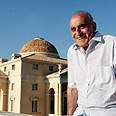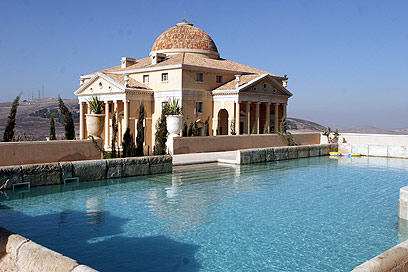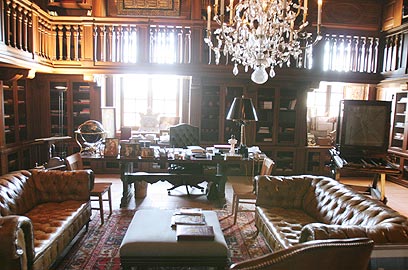
Al-Masri. Vision of Palestinian state
Photo: Atta Awisat
The Palestinian Rothschild
He’s the richest man in the Palestinian Authority. He built a magnificent castle on the summit of Mt. Gerizim, and now he’s a candidate for the position of Prime Minister of the Palestinian unity government. How Munib al-Masri, a geologist from Nablus, became a well-known philanthropist, and what he is doing with a 70-acre yard
Everyone in the West Bank has heard of 72-year old Munib al-Masri, a philanthropist and the richest man in the Palestinian Authority. Al-Masri is being mentioned as a candidate for Prime Minister of the unity government that is supposed to replace the Palestinian Authority’s Hamas-led government. The idea was first raised by Egypt, and has received the blessing of Jordan, the Europeans, and the United States.
Al-Masri has had his photograph published on the front page of Palestinian newspapers. Articles written about him claim that his appointment as prime minister could change the economic situation in the territories, that he is the one man capable of saving the Palestinians from economic collapse. While he is participating in negotiations between Mahmoud Abbas and Hamas, in interviews he is careful not to make political statements, and he refuses to discuss the possibility that he will become prime minister.

Al-Masri's house (Photo: Atta Awisat)
This isn’t the first time that his name has been mentioned in this context. In 1994, after the signing of the Oslo Accords and the establishment of the Palestinian Authority, Yasser Arafat asked al-Masri to become prime minister, but he refused. At that time Arafat was the omnipotent ruler, and al-Masri assumed that he would stay in Arafat’s shadow. When Arafat asked him a second time nine years later, al-Masri once again refused, fearing that his chances of success were minimal. This time the assessment within the Palestinian leadership is that al-Masri will have no choice but to accept.
Plans for peace center
While Al-Masri is not prepared to reveal whether he will accept the position, he has other goals he is happy to discuss. “Here, on my own territory, I’m planning to establish a peace center,” he says. “I want to bring in experts from all over the world to help out in all realms of life to expedite the establishment of an independent Palestinian state. I will build guest rooms here for the guests to stay in, and also a library, offices, appropriate communications arrangements, computers. From here, from this house, the message of development, progress, freedom, and democracy for the Palestinian people will go forth.
“If God gives me the strength I will work to develop the Palestinian economy in order to find a solution to the problem of widespread unemployment. I want the day to come when almost every Palestinian will have work, when the level of unemployment here will be the same as in a normal country. Every time I succeed in finding work for a Palestinian, I am filled with satisfaction and happiness.”
It should be said to al-Masri’s credit that he doesn’t just talk, he acts. He is the largest employer in the territories after the government. For example, Padico, the Palestinian Development and Investment Company, which al-Masri helped found, today employs some 35,000 people. Another al-Masri company, Paltel (the Palestine Telecommunications Corporation), employs 12,000 people. In the mid-1990s he also established a Palestinian stock market in Nablus that was intended to bring in money from private investors for Palestinian companies and to increase employment.
Dreaming of Palestinian state
Until his dreams are fulfilled, al-Masri spreads his money around generously for social welfare and education. He contributes to Palestinians in Jordan and Lebanon, and he has also bought houses near Herod’s Gate in Jerusalem’s Old City in order to prevent them from being bought by Jewish settlers.
“In my life I’ve achieved everything I wanted,” he says. “Now the only thing left to do is fulfill my dream of seeing an independent Palestinian state in the West Bank, Gaza, and East Jerusalem, a state that will be established on only 22 percent of the area of Palestine. For peace I would agree to these borders. We are neighbors who need each other and we can live alongside each other.”
Al-Masri received his undergraduate degree in geology with honors from the University of Texas at Austin, and then did an MA. During his studies he met his wife Angela, who was born in New Mexico. In 1956 he returned to Jordan as a geologist and began working for the American oil company Phillips Petroleum. During those years he established an engineering and geological services company in Jordan that later became EDGO, which today has offices in 29 Middle Eastern and African countries, and handles hundreds of millions of dollars a year. In 1963 al-Masri was appointed president of Phillips in Algeria, and two years later became the company’s chief of operations for the Middle East.
Political career
During those years he belonged to a small group of Palestinian revolutionaries, led by Yasser Arafat, which included Abu Jihad, Abu Iyad, and Abu Mazen. Al-Masri stayed with Arafat in his last days at the Mukata when the building was under siege, and when Arafat got into the helicopter that took him to Jordan, al-Masri was very pained.
He was also with Arafat on the French plane that flew him to the hospital in Paris, and stayed at the leader’s side during the last days of his life. Al-Masri was a member of a select group of Arafat associates who received permission to enter the patient’s hospital room together with Suha Arafat, Abu Mazen, and Abu Ala, but he chose not to exploit this permission. “I went into the hospital,” he recalls, “I got close to Arafat’s room, but I didn’t have the courage to see him on his death bed.”

Al-Masri's house from the inside (Photo: Atta Awisat)
For a short time al-Masri also had a political career. In 1970, at King Hussein’s request, he joined the Jordanian government as Minister of Public Works. For a year and a half he was involved in fixing infrastructure that had been destroyed in the war between Jordan and the Palestinians, and in building road and water infrastructures throughout Jordan. Later he left politics, devoted himself to business, and made millions. It is believed that he will soon return to politics, since this time he is unable to refuse the proposal that he become prime minister. Not only are his fellow Palestinians asking him to accept the position, but the U.S. and European countries also want him to accept, and under the circumstances it will be very hard to turn them down.
Hercules, Picasso, Napoleon
Al-Masri’s palace on Mt. Gerizim is a copy of a 16th-century house, located some 20 miles from Venice, that was designed by the Italian architect Andrea Paldio. Two architects oversaw the construction of al-Masri’s house, and the interior design was done by his son Rabih, who studied architecture at Berkeley. The construction work was done by 260 Palestinians, most from the Nablus area, who worked for four years and were supervised by 14 architects. Almost all of the building materials, including the gravel and sand, were imported from France. Even during the intifada, while battles were taking place in the casbah in Nablus and bombs going off in nearby Ras al-Ein, the construction work continued.
A 16th-century sculpture of Hercules is placed in the middle of the entrance hall. “This is the Palestinian Hercules who will defeat Israel when the time comes,” says al-Masri. The southeast room is called the “Jerusalem room.” In the middle of the northwest room is an 18th-century chair used by Egyptian ruler Ismail, and the walls are decorated with original drawings by Modigliano and Picasso. In the southwest corner is an office.
In the courtyard is a swimming pool whose walls are inlaid with ancient stones imported from France, and alongside the pool is an enormous Jacuzzi and sauna. Inside the house are another pool and sauna.
A dovecote imported from France is located next to the outdoor pool. From there if you go up the steps and climb onto a natural rock, you reach an ancient French structure with heavy glass doors and stone benches inside. According to al-Masri, “This is a house of prayer in which anyone can pray to his God.”
'Settlers are colonialists'
In the garden is a glass house built by Napoleon for his love Josephine that al-Masri bought in an auction in France. How much did he pay? This is a question you must not ask him. In general, al-Masri doesn’t like to talk about money. “I don’t have money in my pocket. The entire house cost me a bit over USD 1,000,” he says, and gives a big laugh.
In the garden are the most ancient olive trees that al-Masri could find in the territories. “The roots of this tree are from the Roman period,” he says. He has planted 4,000 olive trees, 2,000 grapevines, and hundreds of plum, peach, and fig trees, and placed beehives among them. And what happens when he wants to watch a play? He uses his 120-seat Roman-style amphitheater with seats of stone.
When asked why he built his house here, on Mt. Gerizim, al-Masri bursts out laughing. “If I hadn’t bought these 70 acres, the colonialists—the people you Israelis call ‘settlers’—would have built another settlement here. They’re looking for beautiful locations like this.”
What does al-Masri aspire to now that he has fulfilled all the goals he set for himself? “I aspire to peace. For me, peace is an independent Palestinian state alongside Israel that would maintain good neighborly relations with Israel. Peace also means to die without suffering.”















